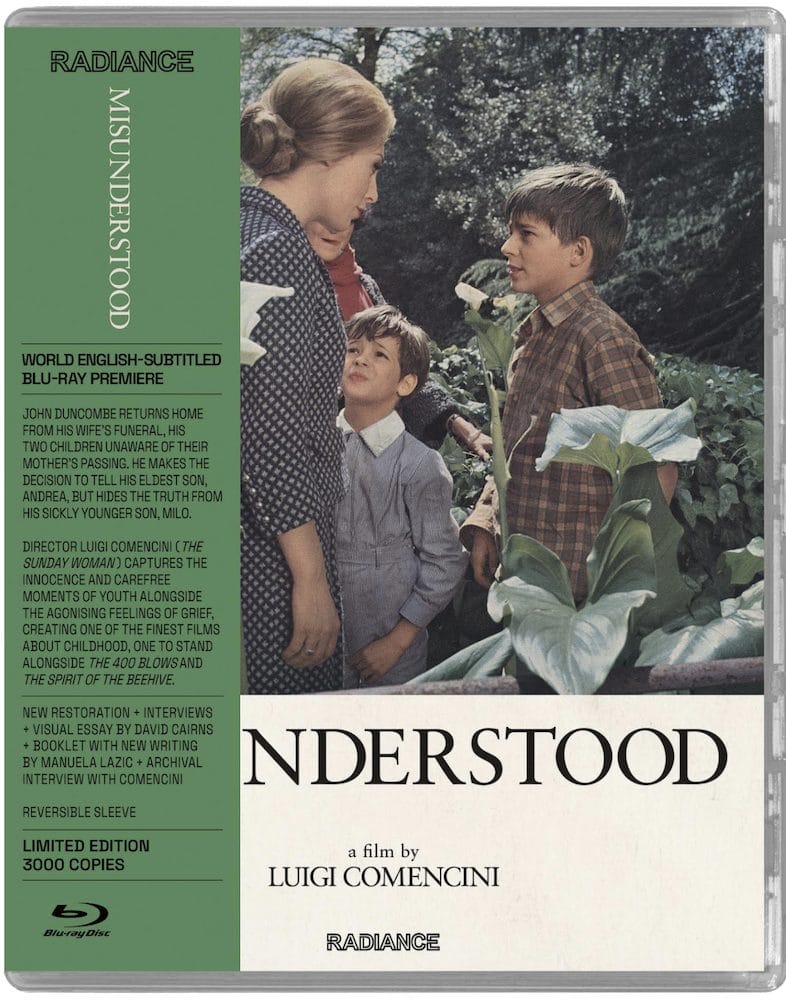Andrea (Stefano Colagrande) is a boy who just found his mother has died, being told by his remote and stoic father John Duncombe (Anthony Quayle) after his mother’s funeral. Andrea has a younger brother, Milo (Simone Giannozzi), who is not told about his mother, with John wanting to spare Milo the sadness and let him live as a child just a little longer. Andrea’s and Miles’ father is often gone, leaving Andrea to be the “man of the house” so to speak, forcing Andrea to grow up and take on responsibility that he may not be ready for. A tragic event occurs that forces John to recognize Andrea for who he really is, but is it too late?
Misunderstood a.k.a. Incompreso (Vita col figlio) is a story of a lost childhood, of a boy forced to mature too quickly and slowly crushed into a sense of complacency beneath the heel of responsibility. Andrea has to watch as his little brother cavorts in a carefree manner and then shoulder the blame when Milo causes trouble. For those unaware, the Italian melodrama, particularly from this time period, tends to have a strong streak of sentimentality to them. While I’m no film scholar, my guess is that it was a kind of overcompensation for the neo-realism movement that occurred in the ’40s and ’50s similar to how the US embraced the excess of the ’80s almost as a counterpoint to the low key grit of the ’70s. Misunderstood definitely embraces the trappings of the melodrama, painting emotions and feelings in broad strokes. There’s no subtext. It’s all text. That isn’t necessarily a bad thing. In a post-ironic world, sometimes we need to be confronted with an earnestness of expression that brings to the fore a sense of humanity that we may sometimes forget. For the most part, director Luigi Comencini straddles a fine line between the grounded and the expressive, following the travails of Andrea and Milo as they travel to Florence on bikes to get their father a birthday present. In a more heavy-handed film, this journey may be fraught with over-the-top hijinks. But instead, we see young boys do what young boys do. Sure, they get into some trouble, but it’s all believable and, by the end, heart-breaking as well. If the film missteps anywhere, it is with the incredibly sentimental final shot. It doesn’t just bring home its message. It demolishes it with a sledgehammer.
Radiance has delivered a fine 2K transfer from the original negative, performing additional clean up after the scan was complete. The film looks very nice, with a naturalistic color palette that represents the film quite well. The audio provided is the original Italian mono track and is quite clean and clear with little noticeable hiss or distortion. For extras, Radiance has provided some nice ones to give additional context to the film and Comencini. First up is an interview with co-screenwriter Piero de Bernardi and Luigi Comencini’s daughter Cristina Comencini (an Academy Award-nominated director in her own right) and is very good at giving a more full picture of Comencini as a director and person as well as giving more context into the kinds of films he was drawn to. We also get A Child’s Heart, a visual essay by film critic and author David Cairns on Comencini and his penchant for making coming-of-age films. Additionally in typical Radiance fashion, we have a very nice physical booklet that includes an essay on “troubled youth” films, including Misunderstood, by film critic Manuela Lazić and an archival interview with Luigi Comencini conducted by Dominique Rabourdin and Jean Roy. Both are well worth reading.
Misunderstood as a film isn’t what I would describe as revelatory in its messaging. But where it excels is in capturing those moments of childhood where you begin to realize the stresses and urgencies of becoming an adult yet are unable to really process the full ramifications of them. While it does lay its message on a bit thick at times, Misunderstood is still a fine film of the last gasp of childhood, and Radiance has done a great job bringing it to the masses.

